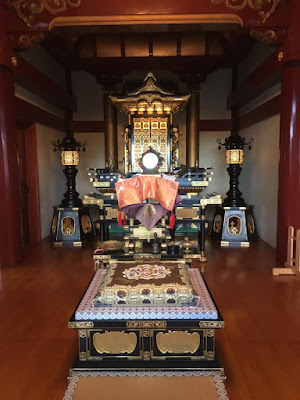I think it really kickstarted when I was 14 years old. I was watching Rurouni Kenshin on Cartoon Network's Toonami block. For those not in the know, this is a series about a wandering samurai, or ronin, who is trying to leave behind his past as the bloodiest, most brutally efficient samurai in all of Japan.
 |
| Shamed of his past, Kenshin vows to leave his old persona behind in an attempt to live a peaceful life. As such, he wields a reverse-blade sword, vowing to never kill again. |
I was fascinated by the feudal Japanese setting, by how grounded the show was compared to the superpower-based battle series I had grown up watching for most of my childhood, by what it taught me about actual Japanese history during the Meiji era. But what really got me, I think, was the ending song. The localization had opted to leave in the entirely Japanese ending. It was my first time really hearing the language. It blindsided me, that song. Me and my best friend at the time were equally taken by it.
Shortly after this, I started watching the Japanese versions of anime. I was fascinated with the fact that these strange words could possibly be another form of communication. That the characters used to write it could actually be read by an entire society of people. That the mannerisms that I had come to expect from the shows I watched and the games I played had very real roots in a very real country and culture.
 |
| I especially loved Naruto, which should come as no surprise. Its emphasis on Japanese folklore and mythology was a huge part of its appeal. |
For a long time in high school, I was a full-on weaboo. I listened to tons of J-Pop, I watched all the popular anime, I even downloaded the soundtracks to my favorite shows. I fell in love with it, not only because it was a new and exotic form of entertainment, but because I loved hearing the language, seeing its cultural differences manifest in its media.
From there, I knew I wanted to go there, someday.
 |
| One of the first sights I saw in Akita, a series of Japanese lanterns held up across the water. |
Fast forward ten years or so, and I finally did end up here. I came here chasing that vestigal love sparked by Japanese media so long ago, most of which had diminished by that point. I only vaguely remembered my intense love for the culture, the novelty of its exoticness having long since worn off. I came here chasing a dying dream, to fulfill a promise made to myself over a decade ago.
Despite my waning interest in Japan, however, I did expect to find some common ground with others here, based on my interests and my introverted personality. While anime has slowly trickled off my plate of interests, I am still a huge gamer, and expected to find a lot people like that here.
In an ironic twist of fate, I got placed in a business school, a school known for its athletic teams more than anything else. Students here were almost the complete opposite of what I expected from Japanese society. Loud, sports-over-school, shooter-playing bros were everywhere. It might as well have been American students speaking Japanese. I literally had kids coming up to me and asking me what my killcount in Call of Duty was.
The ALT community I got involved in was similar. People did play games, but most of them came here for other reasons. To see the culture, to snowboard, to meet people, to go on road trips, to eat the food, etc. Games are an afterthought for most people here.
I suppose it was silly of me to expect people to share my interests simply because those interests came from this country. Still, it came as a surprise.
Not wanting to be a total loner, and wanting to fulfill my role as an agent of cultural exchange, I often found myself wrapped up in other people's activities. I found myself hiking and going on road trips and trying new food and even helping out at bars and starting English conversation classes for adults.
 |
| Samurai armor kept in an old samurai house in Kakunodate. I took this picture. It proves I was there! |
An all-too-familiar feeling came back to me as I did these things.
Eventually, I came to the full realization that it wasn't the games and the anime that I initially loved, at least not at their core. It was the discovery of something new, learning about its differences compared to what I already knew, and coming to appreciate it as its own unique entity that truly gave me that sense of fulfillment and excitement. I loved experiencing a new culture more than anything else.
There is nothing quite like having your first full conversation in another language without any mistakes, or suddenly realizing that you can read the street signs near your house. I vividly recall wondering why I never realized that there a nearby ramen place before, until it struck me that I had just read the sign outside and that I couldn't do that before.
Learning new things about the world is one of life's purest joys, I think.
I guess I always knew that, at my core. I think everyone does. It's just very, very easy to mistakenly attribute it to what you're learning from rather than the process of learning itself.
Armed with this newfound realization, I now find myself in situations like the one I am in today. It's Friday, it's the weekend, and all of my friends are busy. Two big name games just came out - Resident Evil 2 and Kingdom Hearts III - of which I could easily sit at home and play all weekend. But I find myself disheartened that I can't go somewhere and see new things with people instead.
I guess I'll stay in and play games. What a shame.














































